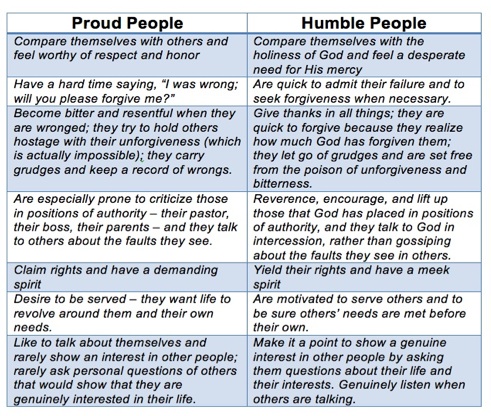Today we come to Part 6 (and the final segment) of “A Humble Life.”
As I wrap up “Lesson 7” in this series on “What I Wish (as a Pastor) that I had Known, Understood, Believed and Lived 30 Years Ago,” I want to add seven more characteristics of “Proud People” vs. “Humble People” to the list I shared with you last week. This list has come primarily from Nancy Leigh DeMoss’ excellent book entitled, Brokenness: The Heart God Revives.
Before you read this, could I ask you to do one thing? Promise that you will not focus on how this applies to anyone else except your own heart:
Here they are:
Have you noticed that people typically do not like “proud, arrogant people?” Nor do they enjoy being around them. And yet, even though we know this to be true, we find ourselves (at times) somewhere on the left side of the above list. This is part of maturity and growing in Christ. None of us have “arrived” in our sanctification process (nor will we this side of heaven).
The prayer I would encourage all of us to pray on a regular basis is… “O Lord, I need your grace today! You promise grace to the humble. Help me to avoid looking at everyone else’s life to determine who is proud and who is humble. May I only ever examine my own heart, and choose humility each and every day.”
Tom Hovestol, in his book entitled Extreme Righteousness: Seeing Ourselves in the Pharisees, writes the following:
“The more spiritually alive and mature we are, the more we recognize how far short we fall of the glory of God. The closer we get to a mirror, the more clearly we perceive our imperfections. The mirror for Christians is Christ. Therefore, it should not surprise us that those who have known Him best have been most aware of their imperfections and most appreciative of His love and grace.”
Alan Nelson, in his book Embracing Brokenness: How God Refines Us Through Life’s Disappointments, writes the following about “seven tests of true humility.”
TESTS OF TRUE HUMILITY
There are several ways to detect humility in yourself or in others. Here are seven common ways to spot a humble spirit.
- Humility does not demand its own way. If you think “It’s my way or the highway,” or if you often feel the need to defend yourself, chances are your humility level is low.
- Humility exudes an attitude of service. You are there to help people, not to be helped. Jesus said, “I came to serve, not to be served.” It is not a consumer-oriented atmosphere where you shop around for who or what can give you the best deal.
- Humility does not seek attention or credit. It is not concerned with having its name placed in the program, or on the dedicatory plaque, or even spelled correctly. There is almost a feeling of awkwardness that comes over humble people when the spotlight shines in their direction.
- Humility forgives when offended, but is hard to offend. Perhaps the best way to avoid being offended by others is to become humble. Humble people do not read into others’ responses. Therefore, they are free to be honest and innocently naïve to the hate generated by others. At the same time, when hate is overt and obvious, they are at liberty to forgive, to release others from a false sense of obligation to love a certain way.
- Humility does not criticize others. Finger pointing, opinion giving, and condemnation rarely emanate out of a pure, selfless attitude. Most criticism is personally oriented and seeks to punish another. Yet, humble people are not confined by the fear of speaking up for truth. They can be authoritative without being authoritarian because God is their motivation for making suggestions.
- Humility produces a teachable spirit. Good leaders are learners. That is why leaders need to learn humility. Humble people know that they do not know everything, and recognize the multiple nuances that operate when more than one perception is involved in a situation. Humble people practice one of the most important behaviors of learning—they listen a lot. Beware the proud leader claiming to have all the answers. Humble people ask questions more than they give answers.
- Humility is gracious and thankful. Perhaps this is a lost quality in our culture. We are all too aware of our rights and demand them even beyond what normal law affords. If you received a coin with humility on one side, thankfulness would be on the other. It is very hard to be truly gracious and proud. Jesus told the parable of the ten lepers, where only one returned to say, “Thanks.” The New Testament reminds us to give thanks, always.
John MacArthur, in commenting on 2 Corinthians 4:7, writes…
“But we have this treasure in earthen vessels, in order that [a purpose clause in the Greek] the surpassing greatness of the power may be of God and not from ourselves.”
That is why God puts the priceless treasure in clay pots, so that no one has to ask where the power comes from! In comparison to the glory of the eternal God revealed in the person of Jesus Christ, in comparison to the magnificence of the New Covenant expressed all through chapter 3 of 2 Corinthians, in comparison to Christ’s shining glory, the preacher is nothing!…
A clay pot is a clay pot. It is without value, but it is useful. Clay pots in ancient times were used for a number of things. Sometimes something important was in a clay pot, like the Dead Sea Scrolls…But in the home they…were used for garbage and waste, to carry out what was unmentionable…
So we can better understand 2 Corinthians where Paul says, “We have this treasure in a garbage can, a waste bucket.”
We are common containers for the most humble and dirty uses; never, ever fit in ourselves to be brought into public. That’s how it is in the ministry.
Our only value is as containers. It’s the treasure that we bring that has the value. That’s why the Lord didn’t choose many mighty or noble.
He has chosen the humble, the base, the common. This is the essence of spiritual service. They accused Paul: “You’re weak; you’re unimpressive; you’re not a good communicator…” His response was this: “I know; I know. I’m just a pot – but do I have a treasure!”
The New Testament was not written by the elite of Egypt. It was not written by the elite of Greece, or Rome, or even Israel. . . . The most distinguished philosophers were at Athens; the most powerful leaders . . . of men were at Rome; and the religious geniuses were in Israel’s temple – and God never used any of them! He just used clay pots. . . .
We have peasants and fishermen, smelly guys, and tax collectors, clay pots, who were chosen to hold and to proclaim and to write the priceless treasure of gospel truth.
God is still doing it that way. He is still passing by the elite… God is finding the humble who will carry the treasure of saving truth…
If you want to be used mightily by God, get yourself out of it. Learn to see yourself as a garbage pail, or, in the words of Peter, clothe yourself with humility.
It’s not you; it’s not your personality; it’s the Word of God. He doesn’t need the intellectuals. He doesn’t need great people, fancy people, or famous people. Because the people aren’t the power. The power is the message!…
We ministers are weak, common, plain, fragile, breakable, dishonorable, and disposable clay pots who should be taking the garbage out – but instead we’re bringing the glory of God to our people.
The amazing thing is that such weakness does not prove fatal to the gospel, because the gospel is not out of us. The great reality is, this is essential to the gospel, because it makes crystal clear where the power really lies.
We are unworthy servants, but God has given us the treasure of the gospel. What a privilege!
(John MacArthur, “A Reminder to Shepherds,” in Feed My Sheep: A Passionate Plea for Preaching, edited by Don Kistler (Soli Deo Gloria, 2002), p. 279-285.)
I leave you as I close out this “lesson” on humility with the following Scripture verses…
“When pride comes, then comes disgrace, but with humility comes wisdom!” (Proverbs 11:2)
“The fear of the Lord teaches a man wisdom, and humility comes before honor!” (Proverbs 15:33)
“Do nothing out of selfish ambition or vain conceit, but in humility consider others better than yourselves.” (Philippians 2:3)
“For whoever exalts himself will be humbled, and whoever humbles himself will be exalted!” (Matthew 23:12)
“If my people who are called by my name will humble themselves and pray and seek my face and turn from their wicked ways, then will I hear from heaven and will forgive their sin and will heal their land!” (2 Chronicles 7:14)
“This is the one I esteem: he who is humble and contrite in spirit, and trembles at my word!” (Isaiah 66:2)
“The Lord detests all the proud of heart. Be sure of this: They will not go unpunished.” (Proverbs 16:5)
“Pride goes before destruction, a haughty spirit before a fall.” (Proverbs 16:18)
And finally…
Augustine once made this statement:
“If you ask me what is the #1, #2, #3 most important quality of a Christian, I will answer by saying: Humility, Humility, Humility!”





Leave a Reply